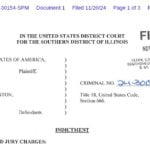WHEELING, IL. (ECWd) –
The Illinois Open Meetings Act – a simple, easy to read document which codifies the public’s right to speak at meetings, and to address their public officials during the public comment portion of open public meetings.
(5 ILCS 120/2.06) <span style="font-family: Courier New;">(from Ch. 102, par. 42.06)</span>
<span style="font-family: Courier New;">Sec. 2.06. </span><span style="font-family: Courier New;">Minutes; right to speak.</span>
(g) Any person shall be permitted an opportunity to address public officials under the rules established and recorded by the public body.
I see nothing in the above paragraph stating the public can only address “the board chairman” or “the board as a whole” or “the village president” or any other restrictions on who the public has the statutory right to address during the public comment portion of a public meeting.
Indeed, it says “address public officials” meaning each and every public official in the meeting. Any purported rules infringing on that right are invalid.
The law firm of Klein Thorpe Jenkins has a history of giving what we believe to be bad advice to the public officials they represent – a recent example is the horrible representation given to the Orland Park Public Library while that board was defending their decision to not restrict access to child pornography in a public library. This was a library that spent upwards of $480,000 to try and keep public records from the public and to thwart the Open Meetings Act. The Village of Orland Park Police Department ended up paying $12,000 for FOIA violations, and the library paid $55,000 for FOIA violations.
“Under the rules established and recorded by the public body“
Yes, the statute says a person can speak “under the rules” established and recorded by the public body. What that means, is “time, place, and manner” rules, ie: a public body may develop rules that enhance the public’s ability to speak without further restricting the right of the public to speak and address their public officials during the meeting. What this generally means is that a public body may make rules stating the time limit per speaker, overall time limit for public comment, or the portion(s) of the meeting where comment is placed.
The Illinois Attorney General’s Public Access Counselor has weighed in on this several times, and has always been consistent – enhance, not further restrict.
“James V. Ferolo – Inks letter” (LOL)
Our readers will remember a couple weeks ago when Wheeling Village President trampled all over a speaker’s constitutional and statutory right to address her public officials.
Wheeling’s next step was to issue her a letter explaining their rules for her to comment – which will surely end up in the courts with Wheeling losing miserably.
Ferolo tells her that according to Village Code “members of the public may address the board” – what he magically forgets is that the Open Meetings Act trumps any Village Code, and that state law says the public has a right to speak and the shall be permitted that right to speak. Wheeling needs to change their code to read “members of the public have a right to address public officials…” – Strike 1.
Village Code is also subordinate to the OMA when they try and limit public comment to “the board” – which is not in keeping with state law. Strike 2.
Ferolo then tries to convince her that the Village’s adoption of Robert’s Rules of Order somehow allows the village to violate her constitutional and statutory rights with Rule Number 7:
“Speakers must address their remarks to the presiding officer, be courteous in their language and deportment, and avoid all personalities, never alluding to the officers or other members by name, where possible to avoid it, nor to the motives of members”
“Debate must address issues not personalities and that no one is permitted to make personal attacks or question the motives of other speakers.”
Strike 3.
I don’t know who Mr. Ferolo thinks he is, or who this public body thinks they are, but their rules are invalid and unenforceable. Never mentioning an officer by name…what a joke Wheeling is. Do they think they are special? This letter will become the laughing stock of law offices across the state.
Mr. James V. Ferolo – we suggest you govern yourself accordingly and give accurate advice to the Wheeling public officials you are being paid to advise.
I only hope you didn’t bill the village for this piece of trash letter. If you did get paid for this, please voluntarily return the payment. Please, attorney Ferolo, please take your law license off the wall and gently feed it into the shredder.
Read this joke below:
KTJ-Wheeling







6 Comments
Danni Smith
Posted at 11:09h, 16 Septemberwheeling run by crooks? That mayor and his food costs? That board and their special treatment of certain citizens? That meeting, refusing to allow a citizen to speak? This is a swamp, Wheeling residents.
Deborah Wilson
Posted at 13:01h, 16 SeptemberActually, this is Pat Horcher, the new Village President of Wheeling. He just won the April 4, 2017 election. It was the previous Village President who had a lot of food costs. That being said, this new Village President’s actions at this meeting were very disappointing for a lot of reasons, but not for any food costs.
Kevin duJan
Posted at 03:35h, 16 SeptemberAnother attorney with Klein Thorpe Jenkins — James Fessler — is featured prominently in the book that Megan Fox and I wrote last year about Orland Park. Fessler repeatedly violated the OMA and even made false police reports to try to scare away the public. His conduct was beyond egregious and he became the laughingstock of all Chicagoland when Megan and I caught him on videoing behaving like a jackass at a board meeting. Another two of Klein Thorpe Jenkins’ attorneys are also complete laughingstocks: E. Kenneth Friker (the “E” stands for “Eugene,” but he makes people call him “Ken” instead of Eugene for some bizarre reason) and Dennis Walsh. Both of these clowns repeatedly gave the OPPL what I think was proven to be terrible advice that dug the OPPL deeper and deeper into trouble with FOIA and OMA violations. In my opinion, the Library as a client should have taken actions against their attorneys for malpractice. When a homeschooling mom in the suburbs and a whimsical gay man (that’s me), who are not attorneys, repeatedly defeat a law firm like Klein Thorpe Jenkins and make them look like fools (and then write a book about the experience!) a public body should question if this law firm deserves to receive any more checks from the public. In my opinion, Klein Thorpe Jenkins is offensive at best and a menace to the public in practice, in that what I believe they do is tell public bodies weird ideas for getting away with doing bad things to the public. They should tell their clients “NO, you can’t do that because it’s against the law” but they seem to be hired by public bodies to say, “Do what you want and we will try to make an excuse for you later, at $300/hour in billing.” Our book is called SHUT UP!: The Bizarre War that One Public Library Waged Against the First Amendment. There are several chapters all about Klein Thorpe Jenkins (which Megan and I faced in Tinley Park and Oak Forest as well as Orland Park, and we beat them every time we were up against them; they never won once!).
Deborah Wilson
Posted at 19:33h, 15 SeptemberSince the statute states that the rules must not just be “adopted” but recorded, and since the Village of Wheeling failed to “record” the rules directly into the municipal code, then I don’t think that “adopting” Robert’s Rules is going to matter much since they did not transcribe them directly into the local code like the Illinois Open Meetings Act requires. I have not spoken to any attorneys about this idea, however, it is my understanding that “statutory language” must be “strictly construed” and any attorney is going to know that, so either they are not listening to their attorney, or, they are not consulting with their attorney, or their attorney is telling them what they want to hear with the full knowledge that it will fail in court. I am no attorney, but that is my best guess.
Kevin duJan
Posted at 09:04h, 16 SeptemberI spent the last several years studying this firm and how it operates. What I believe Klein Thorpe Jenkins has as its business model is being the law firm that a public body hires when it wants to break the law and attempt to get away with it. I think KTJ runs a numbers game: they tell the public body that the illegal thing they want to do will likely not be challenged since the public does not know its rights. Many people on these local boards are idiots. They think whatever a lawyer says is true, regardless of the ethics of the lawyer. If you look hard at the public bodies who hire KTJ you will see it seems to be a majority of them WANTING to break the law and have someone tell them it is okay. So, in an analogy, KTJ is the friend you can count on to always tell you that you look fabulous whether you fit in your new clothes or not; they won’t ever tell you that you are a tragic fashion disaster. They encourage you to wear the polka dot tarp with the zebra print shoes, because they want to stay your friend as being friends with you is super lucrative. This is there niche in my opinion, after watching these people operate for years and writing a book that is largely about them and their misdeeds.
Joe
Posted at 12:28h, 15 SeptemberI thought “Robert’s Rules” only governed the members of the Board anyway.